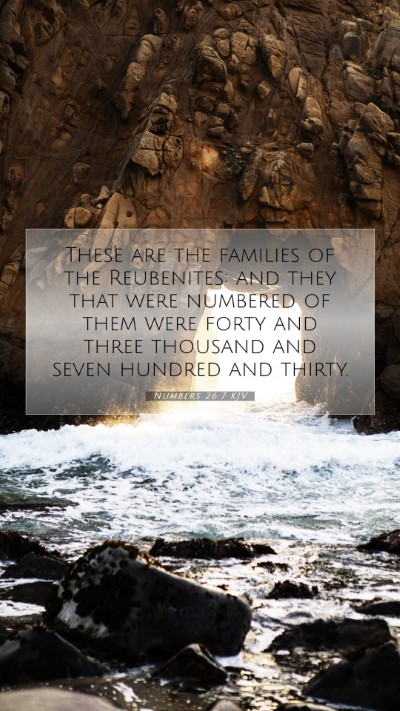Understanding Numbers 26:7
Numbers 26:7 reads: "These are the families of the sons of Reuben, the firstborn of Israel: the Hanochite family and the Palluite family." This verse is a part of the second census of the Israelites conducted in the wilderness of Sinai. Here, we will explore the various meanings, interpretations, and explanations of this verse based on public domain commentaries such as those by Matthew Henry, Albert Barnes, and Adam Clarke.
Bible Verse Meanings
The meaning of Bible verses often requires careful examination of the historical context, as well as the theological significance. Numbers 26:7 focuses on the genealogical record of Reuben, the firstborn son of Jacob. Each family line is mentioned, emphasizing the importance of lineage in the tribal structure of Israel.
Bible Verse Interpretations
Albert Barnes points out that this census not only provided a military organization for Israel but also reaffirmed God’s covenant with Abraham regarding the multiplication of his descendants. The reference to the families under Reuben establishes not only their identity but also their roles and responsibilities within the camp.
Bible Verse Understanding
Matthew Henry explains that the families listed within this verse signify the special purpose of each tribe. The Hanochites and the Palluites are named to illustrate the branching of Reuben's lineage and how these families contribute to the nation of Israel. This naming also reflects God's order and structure within His chosen people.
Bible Verse Explanations
Adam Clarke provides insight into the meaning behind the specific family names. He suggests that these names carry historical and spiritual significance, illustrating how each family contributed to Israel's identity. Each of these tribes would later play distinct roles in the conquest of Canaan and the division of the promised land.
Scripture Analysis
From a scripture analysis perspective, this census highlighted the transition of Israel from a family unit into a nation. Each family had its proper place within the society and contributed to the community’s overall structure. This verse also serves to remind the readers of God’s faithfulness to His promises, as seen in the continued existence of the tribes and their future roles.
Biblical Exegesis
Biblical exegesis of Numbers 26:7 elucidates the importance of familial and tribal lines in the narrative of Israel's history. The inclusion of specific family names serves to validate their existence and significance in God’s unfolding plan for His people. Furthermore, it also highlights the need for unity among these families as they journey towards their promised inheritance.
Bible Study Insights
For those engaged in Bible study insights, Numbers 26:7 may point towards understanding how God meticulously prepared His people for their future. Studying such passages can deepen one's appreciation for the details that God incorporated in the formation of His chosen nation.
Meaning of Bible Verses
The meaning of Bible verses like Numbers 26:7 stretches beyond mere genealogy; it signifies the establishment of a strong national identity rooted in God’s covenant. Recognizing these genealogical records can enhance one's theological understanding and appreciation of scripture.
Understanding Scripture
Understanding scripture in Numbers requires looking beyond the text. The mention of each family cultivates a broader understanding of community, identity, and divine purpose. The act of naming brings a sense of belonging and place among God's people.
Cross References
- Genesis 49:3-4: Jacob's blessings on his sons.
- Exodus 6:14-16: The genealogy of Moses and Aaron, including Reuben's descendants.
- Numbers 1:20-21: The initial census of the Israelite tribes.
- 1 Chronicles 5:1-2: A historical account regarding the tribes of Reuben.
Application of Bible Verse
The application of Numbers 26:7 to modern life may be found in the importance of knowing one’s roots and the value of community. Just as the families of Reuben contributed to the greater society, individuals today can recognize their unique contributions to their communities and churches, reflecting on God’s plan for each person’s life.
Bible Study Resources
For further study, consider utilizing online Bible study tools and resources to deepen your understanding of genealogical passages and their implications in biblical history. Connecting with Bible study groups may also provide opportunities to discuss these insights collaboratively and engage in meaningful dialogue on the text.


